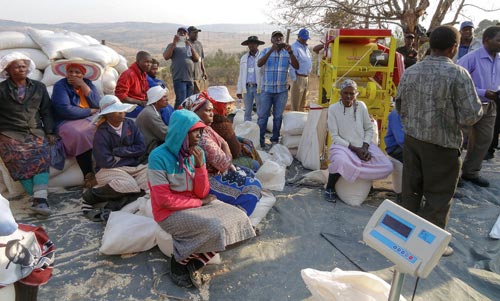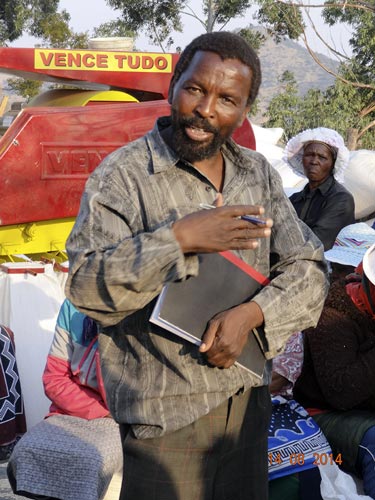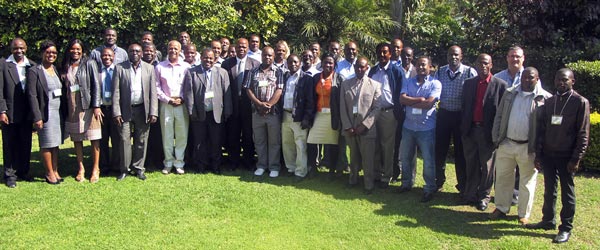
In Swaziland, maize is a staple crop and a source of income for many of the nation’s farmers. “The work on our staple crop cannot be overstated,” said Dr. Vusumuzi Mkhonta, acting director, Department of Agriculture, Research and Specialist Services in Swaziland. “If anything were to happen to maize, the entire population might perish.”
Mkhonta was speaking at the opening ceremony of the annual collaborators meeting, which brought together partners of the New Seed Initiative for Maize in Africa (NSIMA) and the Drought Tolerant Maize for Africa (DTMA) projects in Mbabane, Swaziland, held 13-15 August. Mkhonta recognized the importance of maize research in the country to enhance food security and livelihoods. He also expressed appreciation for support from the Centre for Agricultural Research and Development in Southern Africa (CCARDESA).
Participants discussed some of the challenges in maize breeding that impact the delivery of improved seed. These include the parasitic weed Striga and maize lethal necrosis (MLN), a deadly disease that has affected maize-growing areas in eastern Africa.
The CIMMYT-led NSIMA project, funded by the Swiss Agency for Development and Cooperation (SDC), involves five countries: Botswana, Democratic Republic of Congo (Katanga Province), Lesotho, South Africa and Swaziland. In South Africa, the project is implemented in the Eastern Cape, KwaZulu Natal and Limpopo provinces, serving smallholder farmers who do not have access to maize hybrid seeds. “The large seed companies that operate in South Africa cater to commercial farmers and sell seed in huge quantities,” said James Gethi, CIMMYT seed system specialist and NSIMA project leader. “This means that farmers who need about two to three kilograms of seed are left out of the improved seed network.”

Since its inception, the project has been contributing to food and seed security in the southern Africa region. “Within three years, we have delivered 500 tons of open-pollinated varieties (OPVs) of improved seed to smallholder farmers within the NSIMA countries,” said Gethi, citing this as a key highlight of the project.
“Seed production is the second most important pillar for DTMA,” said Dr. Tsedeke Abate, the project leader. Abate indicated that in Kenya, seed production in the past year was significantly lower as a result of MLN disease. Abate highlighted the importance of the partnership between the project and small- to medium-sized seed companies that play an important role in disseminating drought- tolerant maize seed to farmers.
Dr. Abebe Menkir, a maize breeder with the International Institute of Tropical Agriculture (IITA), gave a keynote address during the meeting. “Resistance to Striga is an important trait for maize varieties specifically developed for areas infested with the parasite,” said Menkir. “Let us bring the technologies together to benefit farmers.”
“We need innovative systems for transforming agriculture and research results as business,” said Professor Timothy Simalenga, Executive Director of CCARDESA. Simalenga gave an overview of CCARDESA’s role, which cuts across the research value chain.
Participants visited a seed processing unit in Malangeni, run by a community-based organization (CBO) that currently produces ZM521, an improved OPV. “This women-dominated farmers’ group specializes in producing certified seed for use by the community,” said Gethi. With assistance from the SDC-supported Seed and Markets Project (SAMP), the farmers have acquired machinery. “CIMMYT is providing the group with basic seed and technical support for production of certified seed.”
The DTMA project also awarded country teams for their efforts in breeding and dissemination of drought- tolerant maize during the meeting. The Zimbabwe and Angola teams won the breeding and dissemination awards, respectively. The winners received a plaque and cash prizes.

In Swaziland, maize is a staple crop and a source of income for many of the nation’s farmers. “The work on our staple crop cannot be overstated,” said Dr. Vusumuzi Mkhonta, acting director, Department of Agriculture, Research and Specialist Services in Swaziland. “If anything were to happen to maize, the entire population might perish.”
 Climate adaptation and mitigation
Climate adaptation and mitigation 
